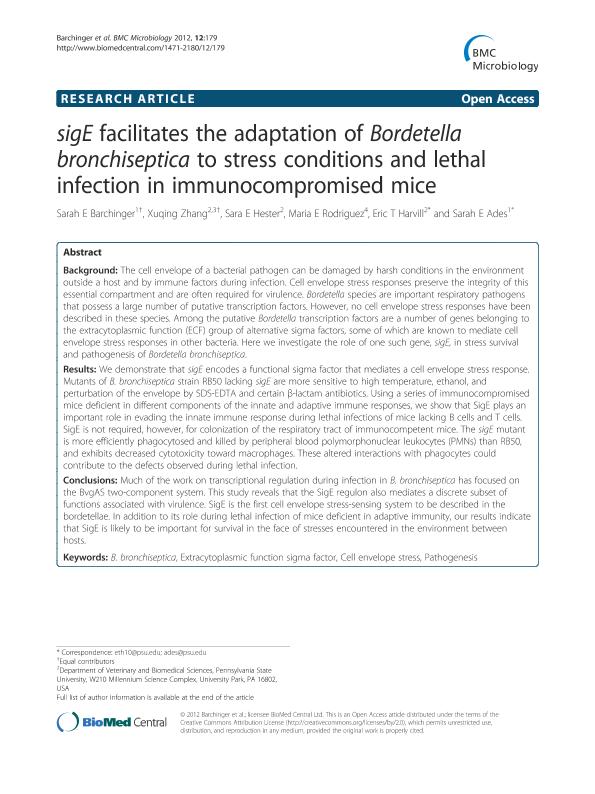Mostrar el registro sencillo del ítem
dc.contributor.author
Barchinger, Sarah E.
dc.contributor.author
Zhang, Xuqing
dc.contributor.author
Hester, Sara E.
dc.contributor.author
Rodriguez, Maria Eugenia

dc.contributor.author
Harvill, Eric T.
dc.contributor.author
Ades, Sara E.
dc.date.available
2020-01-07T19:53:26Z
dc.date.issued
2012-08
dc.identifier.citation
Barchinger, Sarah E.; Zhang, Xuqing; Hester, Sara E.; Rodriguez, Maria Eugenia; Harvill, Eric T.; et al.; sigE facilitates the adaptation of Bordetella bronchiseptica to stress conditions and lethal infection in immunocompromised mice; BioMed Central; BMC Microbiology; 12; 1; 8-2012; 179-185
dc.identifier.issn
1471-2180
dc.identifier.uri
http://hdl.handle.net/11336/93902
dc.description.abstract
Background: The cell envelope of a bacterial pathogen can be damaged by harsh conditions in the environment outside a host and by immune factors during infection. Cell envelope stress responses preserve the integrity of this essential compartment and are often required for virulence. Bordetella species are important respiratory pathogens that possess a large number of putative transcription factors. However, no cell envelope stress responses have been described in these species. Among the putative Bordetella transcription factors are a number of genes belonging to the extracytoplasmic function (ECF) group of alternative sigma factors, some of which are known to mediate cell envelope stress responses in other bacteria. Here we investigate the role of one such gene, sigE, in stress survival and pathogenesis of Bordetella bronchiseptica. Results: We demonstrate that sigE encodes a functional sigma factor that mediates a cell envelope stress response. Mutants of B. bronchiseptica strain RB50 lacking sigE are more sensitive to high temperature, ethanol, and perturbation of the envelope by SDS-EDTA and certain -lactam antibiotics. Using a series of immunocompromised mice deficient in different components of the innate and adaptive immune responses, we show that SigE plays an important role in evading the innate immune response during lethal infections of mice lacking B cells and T cells. SigE is not required, however, for colonization of the respiratory tract of immunocompetent mice. The sigE mutant is more efficiently phagocytosed and killed by peripheral blood polymorphonuclear leukocytes (PMNs) than RB50, and exhibits decreased cytotoxicity toward macrophages. These altered interactions with phagocytes could contribute to the defects observed during lethal infection. Conclusions: Much of the work on transcriptional regulation during infection in B. bronchiseptica has focused on the BvgAS two-component system. This study reveals that the SigE regulon also mediates a discrete subset of functions associated with virulence. SigE is the first cell envelope stress-sensing system to be described in the bordetellae. In addition to its role during lethal infection of mice deficient in adaptive immunity, our results indicate that SigE is likely to be important for survival in the face of stresses encountered in the environment between hosts.
dc.format
application/pdf
dc.language.iso
eng
dc.publisher
BioMed Central

dc.rights
info:eu-repo/semantics/openAccess
dc.rights.uri
https://creativecommons.org/licenses/by/2.5/ar/
dc.subject
B. BRONCHISEPTICA
dc.subject
CELL ENVELOPE STRESS
dc.subject
EXTRACYTOPLASMIC FUNCTION SIGMA FACTOR
dc.subject
PATHOGENESIS
dc.subject.classification
Biotecnología relacionada con la Salud

dc.subject.classification
Biotecnología de la Salud

dc.subject.classification
CIENCIAS MÉDICAS Y DE LA SALUD

dc.title
sigE facilitates the adaptation of Bordetella bronchiseptica to stress conditions and lethal infection in immunocompromised mice
dc.type
info:eu-repo/semantics/article
dc.type
info:ar-repo/semantics/artículo
dc.type
info:eu-repo/semantics/publishedVersion
dc.date.updated
2019-04-26T18:19:12Z
dc.journal.volume
12
dc.journal.number
1
dc.journal.pagination
179-185
dc.journal.pais
Reino Unido

dc.journal.ciudad
Londres
dc.description.fil
Fil: Barchinger, Sarah E.. State University of Pennsylvania; Estados Unidos
dc.description.fil
Fil: Zhang, Xuqing. State University of Pennsylvania; Estados Unidos
dc.description.fil
Fil: Hester, Sara E.. State University of Pennsylvania; Estados Unidos
dc.description.fil
Fil: Rodriguez, Maria Eugenia. Consejo Nacional de Investigaciones Científicas y Técnicas. Centro Científico Tecnológico Conicet - La Plata. Centro de Investigación y Desarrollo en Fermentaciones Industriales. Universidad Nacional de La Plata. Facultad de Ciencias Exactas. Centro de Investigación y Desarrollo en Fermentaciones Industriales; Argentina
dc.description.fil
Fil: Harvill, Eric T.. State University of Pennsylvania; Estados Unidos
dc.description.fil
Fil: Ades, Sara E.. State University of Pennsylvania; Estados Unidos
dc.journal.title
BMC Microbiology

dc.relation.alternativeid
info:eu-repo/semantics/altIdentifier/url/https://bmcmicrobiol.biomedcentral.com/articles/10.1186/1471-2180-12-179
dc.relation.alternativeid
info:eu-repo/semantics/altIdentifier/doi/https://doi.org/10.1186/1471-2180-12-179
Archivos asociados
